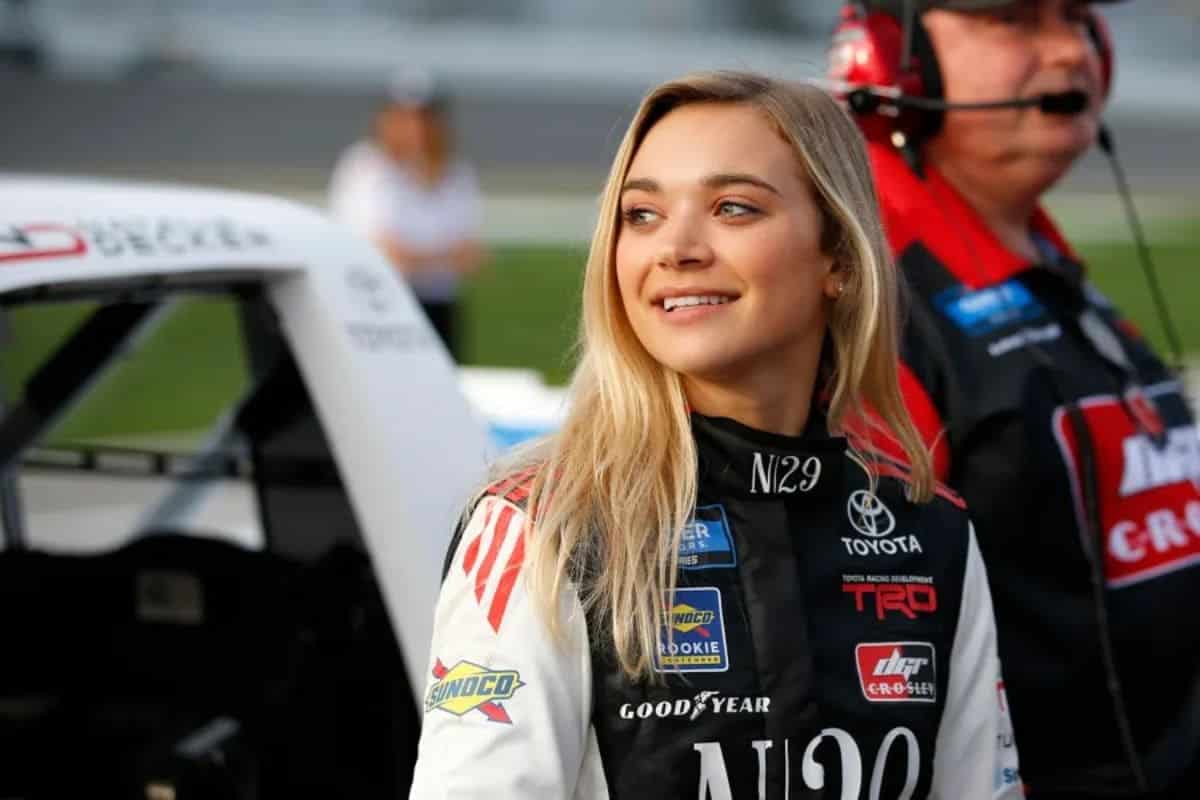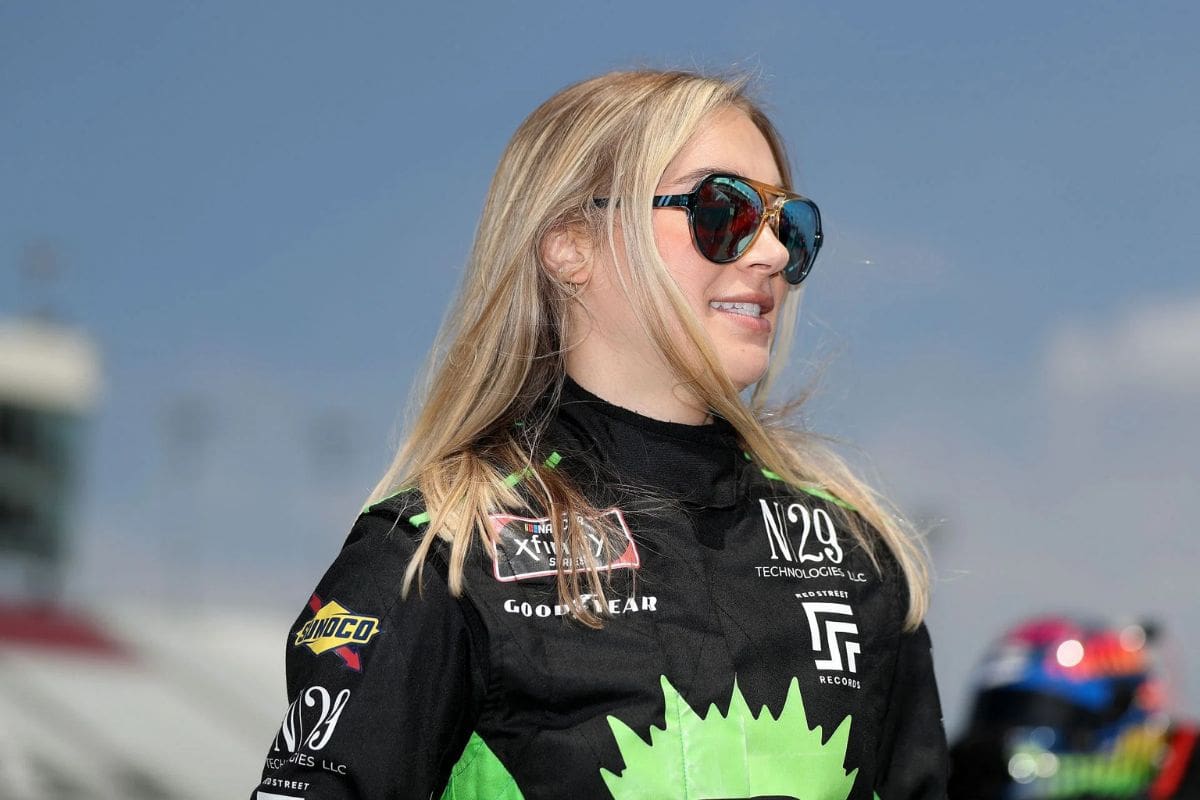Natalie Decker’s NASCAR Practice Solution: Natalie Decker’s pioneering approach to NASCAR practice strategies marks a significant shift from traditional methods, integrating advanced simulation technology with real-world track sessions. This hybrid model not only boosts the drivers’ adaptability to varied racing conditions but also offers a sustainable solution to the physical and financial constraints of continuous on-track training. By effectively merging virtual and actual driving experiences, Decker’s method could potentially set a new paradigm in motorsports training, encouraging a broader discussion on its applicability and impact across the racing industry. How might this influence the future training protocols for new drivers entering the sport?
Key Takeaways
- Natalie Decker advocates for a hybrid practice model, blending technology with traditional track time.
- Critiques current NASCAR practice limitations, highlighting the need for more track time.
- Emphasizes the importance of actual driving experience for driver development and confidence.
- Proposes inventive methodologies to overcome economic and logistical constraints in practice regimes.
- Her approach could set new standards for NASCAR driver preparation, influencing future practice strategies.
Natalie Decker: A Rising Star’s Perspective
Amidst the roar of engines and the high stakes of NASCAR, Natalie Decker has emerged as a promising talent, bringing a fresh perspective to the racing world. Her initial part-time season in one of NASCAR’s top three national series coincided with Kyle Busch’s second Cup Series championship in 2019, setting the stage for her meteoric rise. The following year, Decker made history by securing a fifth-place finish at Daytona, marking the highest finish by a female driver in the Truck Series to date. This achievement not only highlighted her driving prowess but also signaled her potential as a game-changing figure in motorsports.
Decker’s entry into NASCAR has come at a time of evolving dynamics within the sport, aligning with broader discussions around practice regimes and their impact on race day performance. Her performances, underscored by her historic finish at Daytona, have contributed to a growing dialogue on how emerging talents can be better nurtured within the framework of NASCAR’s rigorous demands.
Furthermore, her career trajectory offers valuable insights into the challenges and opportunities that lie ahead for NASCAR in fostering diversity and inclusion. As the sport continues to evolve, Decker’s rise through the ranks exemplifies the changing face of NASCAR, where talent and determination meet opportunity on one of the world’s most competitive stages. Her progression from a part-time entrant to a record-setting performer is a reflection of her resilience and commitment to excellence in a high-pressure environment, setting a precedent for future generations of racers.

Natalie Decker’s Insights
Reflecting on the challenges facing NASCAR, Natalie Decker offered her unique perspective on the sport’s current practice issues during a recent interview with Josh Macuga of FCSE. Decker emphasized the multifaceted nature of these challenges, highlighting not just the technical aspects but also the human elements that contribute to the effectiveness of practice sessions. She pointed out that the integration of advanced simulation technologies could potentially transform how drivers prepare, yet stressed the irreplaceable value of actual track time for honing real-world racing skills.
Decker discussed the balance between virtual training tools and traditional on-track practices, arguing that while simulations can mimic many scenarios, they cannot fully replicate the adrenaline and split-second decision-making required in real races. Her insights suggest a hybrid approach, where technology complements physical experience, could improve both the preparation of drivers and the strategic planning of teams.
Moreover, Decker brought attention to the economic and logistical constraints that affect practice opportunities. She noted that limitations in budget and resources often hit smaller teams hardest, making it difficult for them to compete at the same level as top-tier teams. Her perspective sheds light on the need for a more equitable framework within NASCAR that allows all competitors a fair chance to refine their skills and strategies.
Decker’s Insights on NASCAR’s “Practice” Issue
Natalie Decker’s recent comments illuminate the current challenges and limitations inherent in NASCAR’s practice protocols, emphasizing the significant shift from traditional, ample practice time to the restricted, fineable sessions of today. Decker’s insights emerge amid a broader discourse within the racing community, reflecting a nostalgic yet critical perspective on the evolution of NASCAR’s practice regulations. She highlights a stark contrast between the past, where drivers could freely test and adapt their vehicles on the track, and the current scenario where such opportunities are heavily penalized.
Decker articulates the constraints this places on drivers, particularly new entrants who might benefit most from additional track time. The current policy limits drivers to brief, often insufficient, pre-race sessions that range from 20 to 30 minutes. This drastic reduction in hands-on track experience necessitates alternative preparation methods, which Decker also elaborates on. Her preparation regimen includes watching race footage, physical fitness, nutritional discipline, and hydration—components that are vital yet cannot fully substitute for actual driving practice.
Moreover, Decker touches upon the use of simulators as a supplementary tool. While she acknowledges their benefits in providing some form of tactile feedback and scenario training, she firmly believes that they cannot replicate the complete experience and learning derived from real-life racing. This viewpoint underscores a critical gap in current training protocols, which could potentially hinder a driver’s ability to perform effectively in actual race conditions. Decker’s critique and suggestions call for a reevaluation of practice strategies within NASCAR, aiming to better balance tradition and regulatory constraints for the enrichment of the sport.
Decker’s Winning Mentality
Building on her critique of NASCAR’s practice limitations, Natalie Decker also shares her robust approach to cultivating a winning mentality in highly competitive environments. She encapsulates her mental preparation strategy in the formula ‘A+B=R,’ where ‘R’ represents the results, ‘B’ encompasses external factors beyond one’s control, and ‘A’ denotes the elements one can manage. This framework not only serves as her guiding principle in racing but also offers a universal blueprint for success applicable across different domains.
Decker emphasizes the importance of concentrating on ‘A’, the controllable aspects, which includes meticulous preparation like reviewing race footage, coordinating with her team, maintaining physical wellness through proper diet and hydration, and keeping a razor-sharp focus on the imminent objectives. Such thorough readiness ensures that she enters every race with the maximum advantage her efforts can secure.
The ‘B’ factor represents the unpredictable elements—mechanical failures, actions of other drivers, or adverse weather conditions. Decker’s philosophy teaches resilience, highlighting that while one cannot influence these variables, they can control their response to them.
“But this is all I have to say. A+B=R. So R stands for results. B stands for everything you can’t control, and A stands for everything you can control. So if you’re going into a race weekend, and you’re focusing on everything you can absolutely control, from watching film to being prepared with your team, eating healthy, staying hydrated, and staying mentally focused on the task at hand. The B factor? B is gonna be what it’s gonna be. You can’t control if something breaks on your car. You can’t control if someone wrecks you. But as long as you focus on everything you can control, R, the result.” – (Decker)
This mental framework shifts the focus from fretting over the uncontrollables to fortifying the controllables, thereby optimizing her performance outcomes. Decker’s method is a demonstration of the power of a proactive and prepared mindset, which not only prepares one for the challenges of NASCAR but is equally effective for any high-stakes scenario in life. Her approach underscores a fundamental lesson: mastery over one’s sphere of influence catalyzes the best possible results, irrespective of external conditions.
Looking Forward with Natalie Decker
As anticipation grows among her supporters, Natalie Decker looks to the future with strategic plans and goals aimed at propelling her career forward in the competitive world of NASCAR. After achieving a commendable top-20 finish at Daytona earlier this year, Decker’s trajectory in the racing sphere appears promising. Her ability to navigate the high-pressure environments inherent in NASCAR’s rigorous competitions showcases her resilience and strategic acumen, qualities that are indispensable in the upper echelons of auto racing.
Looking ahead, Decker’s agenda involves not only improving her track performance but also enhancing her visibility and influence within the sport. Her participation in a new YouTube docu-series is a reflection of her multifaceted approach to career development. This series not only serves to engage fans but also to provide an insider’s view of her meticulous preparation and strategic thinking process, further solidifying her brand in the motorsport industry.
For Decker, the future involves a continuous cycle of evaluation and adaptation. Her practices, heavily featured in recent discussions, illustrate a groundbreaking approach to training that could set new standards in NASCAR’s practice regimes. By focusing on inventive practice methodologies, Decker is not merely preparing for upcoming races; she is also shaping potential new norms in driver preparation, potentially influencing the practice strategies of her peers.

News in Brief: Natalie Decker’s NASCAR Practice Solution
Natalie Decker’s hybrid practice approach in NASCAR represents a significant advancement in driver training methodologies. By integrating technological simulations with traditional track experience, this strategy not only boosts driver performance but also sets a new benchmark for the industry.
As this pioneering practice solution gains traction, it is anticipated to revolutionize NASCAR’s training protocols, ultimately leading to more efficient and effective preparation for drivers at all levels of the sport.
Also Read: Natalie Decker Dropped By Her Team: Surprising Decision Divides Fans



